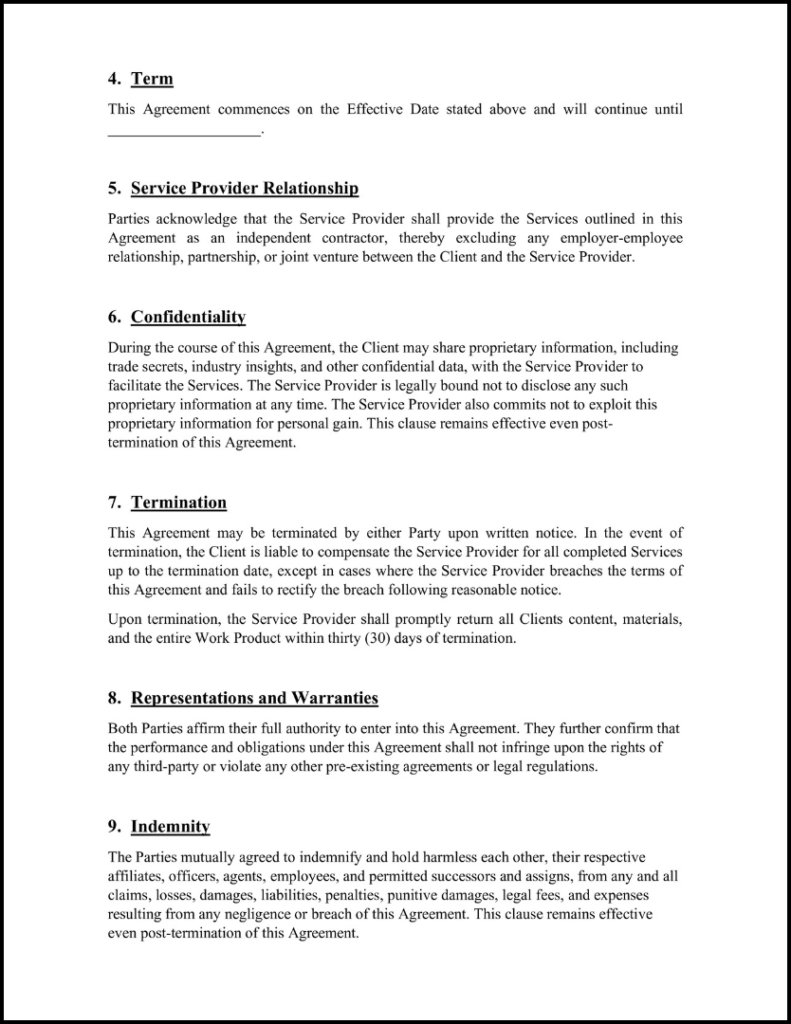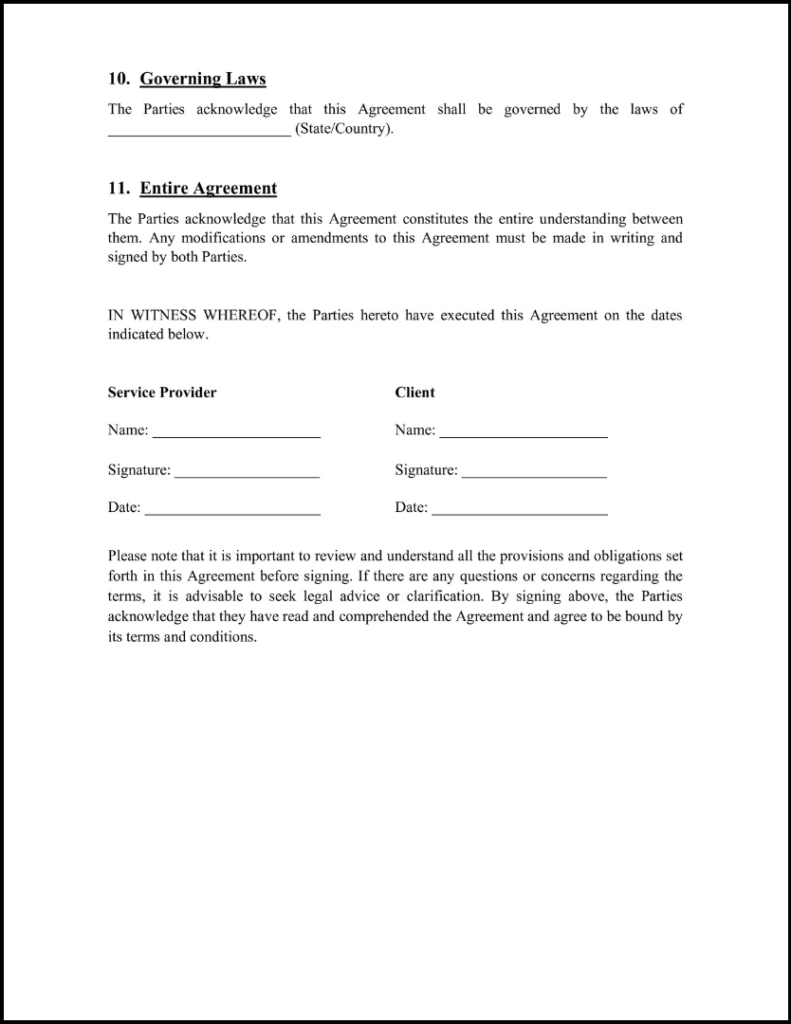Work for Hire Contract
Collaboration lies at the heart of innovation and creativity. Working with others on projects can lead to groundbreaking results, but it’s essential to set the right terms and protect everyone involved. Our Work for Hire Contract Template empowers you to establish clear guidelines, define ownership, and safeguard your intellectual property rights.
By downloading this template, you gain access to a valuable tool that simplifies the contract drafting process. With its user-friendly format and legal language tailored to be easily understood, you can confidently create a comprehensive agreement that suits your specific project needs.
What is a Work for Hire Contract?
In the realm of creative collaborations and project partnerships, a Work for Hire Contract is a pivotal legal agreement establishing the ownership and rights of the work produced during the collaboration. It serves as a protective shield, ensuring that the hiring party or entity retains full ownership of the intellectual property created, rather than the individual or team responsible for its development.
This contract is commonly utilized across various industries where collaborative efforts are prevalent, such as art and design, software development, writing, music production, filmmaking, and more. By defining the scope of work and ownership rights from the outset, a Work for Hire Contract plays a vital role in avoiding potential disputes and fostering a transparent, professional working relationship between the parties involved. Typically, these agreements cover the following:
- Creation of original artwork, designs, or illustrations
- Development of software, websites, or applications
- Writing and literary works, including articles, books, or scripts
- Production of music, audio recordings, or soundtracks
- Filmmaking and video production
- Any other creative or intellectual work developed collaboratively
Free Editable Work for Hire Contract Sample
Access our free Work for Hire Contract sample to safeguard your interests. Download now and take proactive steps toward a secure Work for Hire Contract at no cost.
Why Should You Care About a Work for Hire Contract?
In the world of creative collaborations and joint ventures, caring about a Work for Hire Contract is not just a matter of precaution; it’s a strategic decision that can profoundly impact the success and longevity of your project. Let’s delve into the reasons why this legally binding agreement deserves your attention and consideration:
1. Clear Ownership, Peace of Mind
At the heart of every creative collaboration lies the question of ownership. A Work for Hire Contract settles this matter definitively by ensuring that the hiring party retains full rights and ownership of the work produced. This clarity provides peace of mind, enabling all parties to focus on the creative process without the cloud of uncertainty hanging overhead.
2. Legal Validity and Protection
When creativity flows, it’s easy to overlook the importance of clear terms and agreements. However, having a formal Work for Hire Contract in place strengthens your legal position should any disputes or misunderstandings arise during or after the project. It serves as a safety net, safeguarding your interests and investments.
3. Preserving Your Intellectual Property Rights
Your creative work is a valuable asset, and protecting it should be a top priority. A Work for Hire Contract explicitly defines the scope of work and the ownership rights, ensuring that the hiring party has the exclusive right to use, distribute, and profit from the final product. This measure prevents unauthorized use of your intellectual property and safeguards your creative rights.
4. Transparent Compensation and Terms
In collaborative projects, compensation terms can become complex and ambiguous without an explicit agreement. A Work for Hire Contract outlines the agreed-upon compensation, payment schedule, and any additional expenses, fostering a transparent and mutually beneficial financial arrangement for all parties involved.
5. Demonstrating Professionalism and Trust
Projects that commence without clear agreements may seem casual, but professionalism and trust are the pillars of successful collaborations. Utilizing a Work for Hire Contract displays your commitment to a transparent and structured approach to the project. It reassures your partners that you take the partnership seriously and are dedicated to clear communication.
6. Navigating Project Changes and Challenges
Projects can evolve, and unexpected challenges can arise during the collaborative process. A well-crafted Work for Hire Contract includes clauses that address potential contingencies and change requests, providing a framework for navigating such situations smoothly and professionally.
The Elements of an Effective Work for Hire Contract
Crafting an effective Work for Hire Contract is akin to building a sturdy foundation for your collaborative project. With clear and comprehensive elements in place, this agreement becomes a guiding light, ensuring a harmonious partnership and protecting the interests of all parties involved. Let’s explore the crucial components that constitute an effective Work for Hire Contract:
1. Introduction and Parties
The opening section of the contract sets the stage by introducing the parties entering into the agreement. It provides essential details, such as the names of the hiring party (client or company) and the hired party (individual or team). This section clarifies the purpose of the contract and establishes a formal connection between the parties involved.
2. Scope of Work
A hallmark of a well-structured Work for Hire Contract is its clarity on the scope of work. This element outlines the tasks, deliverables, and project milestones the hired party will undertake. Defining the project’s boundaries and objectives ensures that all parties have a shared understanding of the project’s goals, minimizing the risk of misunderstandings.
3. Payment Terms
In any collaborative venture, financial matters require the utmost attention. The contract must include precise details about the agreed-upon compensation, payment schedule, and any additional expenses involved in the project. Clear payment terms foster transparency and trust, creating a solid financial framework for collaboration.
4. Intellectual Property Rights
Arguably one of the most critical aspects of a Work for Hire Contract, this element addresses ownership of the intellectual property created during the project. It explicitly states that the work produced belongs to the hiring party, granting them exclusive rights to use, distribute, and modify the final product. The hired party relinquishes any claims to ownership, providing a secure foundation for the project’s intellectual property.
5. Confidentiality and Non-Disclosure
Depending on the nature of the project, including confidentiality and non-disclosure clauses can be crucial. These elements safeguard sensitive information, trade secrets, or proprietary data from being disclosed or used inappropriately. Maintaining confidentiality instills trust and professionalism in the collaboration.
6. Termination Clause
Though collaboration is ideally seamless, circumstances may arise that necessitate the termination of the project. A well-crafted termination clause outlines the conditions under which either party can end the contract. This provision helps in resolving potential disputes and provides an exit strategy if the collaboration faces unforeseen challenges.
7. Dispute Resolution
To address the unlikely event of disagreements or conflicts during the project, a dispute resolution clause is invaluable. It specifies the procedures for resolving disputes, such as mediation or arbitration, and encourages open communication to find amicable solutions.
FAQs Related to Work for Hire Contract Template
Work for Hire Contract Sample Preview
Below is the downloadable sample of a Work for Hire Contract:
Disclaimer: Please note that the samples provided here are intended to serve as a helpful resource and should not be considered legal advice. It is important to consult with a qualified attorney or legal professional to ensure that any modifications or usage of these templates align with the specific laws and regulations applicable to your jurisdiction and circumstances. BunnyDoc disclaims any liability or responsibility for the consequences arising from the use or customization of these templates. It is the responsibility of the users to review and adapt these templates to their specific needs, and to seek legal counsel for their particular circumstances.


